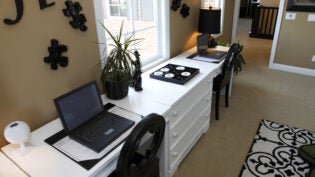
If you’re thinking of starting a business but may be overwhelmed with all of the tasks at hand, consider starting it out of your home. You’ll have lower overhead if you don’t have to pay for office space, and the shortest commute in the world! Here are tips for starting a home-based business.
Determine Your Space
If you plan to start a business services company, you probably won’t need too much space; a desk in a corner, computer, and filing cabinet should suffice. But if you plan to make products or buy and sell them, you’ll need more space. Look at your garage as a potential future office, as well as a basement or guest room.
It’s important to have space dedicated to your small business so that you can separate your home life from your work life. If you have an office door you can shut at the end of the day, you’ll find the separation easier.
Set Up Your Business Structure and Business License
Starting a business at home doesn’t exclude you from needing a business structure. Operating as a sole proprietor or a partnership, you’ll be a bit vulnerable because your personal assets are liable in case of a lawsuit. Consider an LLC or a corporation as a business entity, as they will both keep your personal assets separate from the business.
Depending on the type of business you set up, you may also need a business license or two. If, for example, you plan to bake cookies out of your kitchen and ship them for online orders, you’ll need a bakery permit, and a state-licensed inspector will need to come inspect your kitchen to ensure it’s up to state health and safety standards. If you think you can get away without a business license, think again: if you are found to be operating without one, your business could be shut down.
Create Your First Year Budget
Before starting your home-based business, set up a budget for what you’ll need to spend your first year. You can’t guarantee you’ll see profits in this period (most businesses don’t see them for a while), so you need to ensure you have enough cash to cover office expenses, marketing, staffing and, of course, your personal expenses. You don’t want to start a business only to have to skimp on marketing because you can’t afford it, so starting out with a realistic budget can help you see whether you’re even ready to start the business yet.
Start Slow
Because you’re operating out of your home and don’t have the added expense of an office and other overhead, you may find it easy to start it slowly—perhaps even while still working at your 9-to-5 job—and ease in to growing it as profits start rolling in. This will reduce your financial risk and help you have the income you’ve become accustomed to getting in the form of a salary, at least until your business starts thriving.
This was originally written by Nellie Akalp for Business2Community
Published: June 3, 2013
3209 Views
3209 Views














